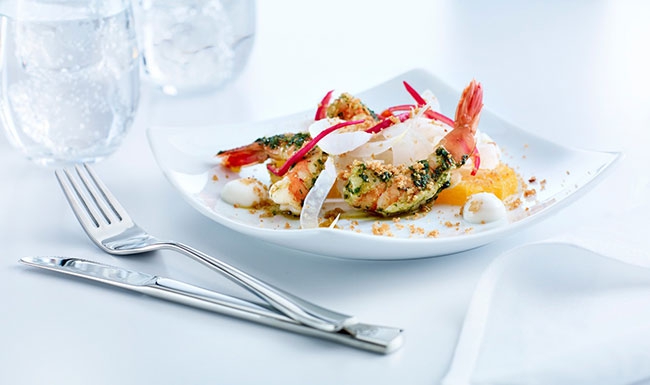
News
Alternate Approach: A plusher experience
Delta Air Lines made news in February when it announced the return of free meal service on long haul domestic flights. Delta was one of the first carriers to take complimentary meals off the menu on longer legs in 2001. Is this a return to air travel as some of us over a certain age remember?
March 3, 2017 By David Carr
 “There has never been greater opportunity for passengers to upgrade on the cheap.” Delta Air Lines made news in February
“There has never been greater opportunity for passengers to upgrade on the cheap.” Delta Air Lines made news in FebruaryAir Canada highlighted a higher quality economy class food offering in its recent rebrand. And what will those who have known nothing but pay-as-you-go austerity in the air think of the added pampering? Delta test marketed the return of complimentary meals late last year. It was met with surprise. Paint me shocked.
The author of this column has always been an advocate of paying for a basic seat and adding on or, in the case of the premium cabin, subtracting to create your own inflight experience within a budget. And it remains a puzzle why airlines have fallen short of the enormous potential. Still, Delta’s announcement illustrates how far service levels in air transport have slipped when free grub grabs the headline. Nevertheless, there is something in the air, if you will forgive the rather lame pun.
There certainly is a shift to better service, whether it is a return of free meals on Delta or improved food choices on Air Canada. The bigger trend, however, may be the effort to push cost conscious bums into plusher premium seats – for a price. This is likely to be a more resilient business practice given that an inevitable hike in oil prices is certain to trigger a fresh round of cabin cost cutting. And this push does not differentiate between the online cheap fare clicker or higher end traveller. After all, even the bottom ninth of the top 10 per cent can’t always afford to splash out on private jet travel for leisure.
Whether commercial or corporate, produce is still the best analogy when looking at an empty airplane seat. Like a rotting tomato, an unoccupied seat (or empty legs in corporate parlance) is costly overhead. Best get something for inventory before the “sell by” date: which for the aircraft is take off.
There has never been greater opportunity for passengers to upgrade on the cheap (either moving up the aisle to the premium cabin, or walking across the tarmac to a private jet) and operators to cash in more on the asset. Here are two examples. Air Canada is set to launch online auctions to move economy ticket passengers into higher margin, premium-economy and business class seats. The service is being provided by Montreal-based Plusgrade, which is already providing a similar service to some 35 airlines worldwide, including Lufthansa, QANTAS and Air New
Zealand. Booked passengers will get an email if premium seats are available on that flight and are encouraged to submit a bid for an upgrade.
According to a recent Globe and Mail report, economy passengers on a Toronto-Rome flight can upgrade to business class for less than half of the original business class fare. The service will be available on both Air Canada mainline and Rouge flights.
It is all about raising the stakes on ancillary revenue and private aviation is not immune. Indeed, the need to offset the cost of operating executive jets may becoming more urgent. The UK’s Economist reports that business jets are becoming harder to justify and cites research by J.P. Morgan, an investment bank, where executive travel is cut by a third over three years at companies taken over by private equity firms. At the same time, the use of private jets for leisure travel is on the rise.
Toronto-based FlyEasy, a software specialist that is already helping operators fill empty legs by connecting customers with seats, has expanded its offering. FlyEasy, whose co-founder cut his private aviation teeth at NetJets, the world’s largest fractional operator, has launched OpenPoint, tracking software that puts the availability of seats and pricing on any corporate jet anywhere in the world at a customer’s fingertips and within minutes.
Passengers whose household budgets do not stretch to premium cabins or private jets, will, nevertheless pay extra for pampering – at the right price. Lower fuel costs may prompt airlines to return some perqs to the economy cabin but the long-term trend will continue to be ancillary fees, no matter how many complimentary meals Delta rolls out. That trend is increasingly going to spill over to the private aviation sector as technology enables operators to cash in on surplus inventory.
David Carr is a Wings writer and columnist.